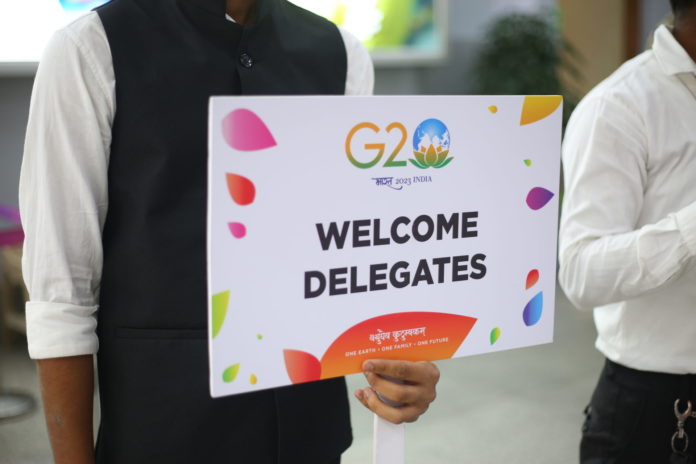Le premier Sommet mondial sur la médecine traditionnelle se tiendra à Gandhinagar (Inde), parallèlement à la tenue d’une réunion des ministres de la santé du G20. Organisé conjointement par l’Organisation Mondiale de la Santé et par le gouvernement indien, la réunion souhaite mettre en évidence le vaste potentiel de la médecine traditionnelle dans la résolution des problèmes urgents liés à la santé, tout comme dans l’augmentation du bien-être des populations et le respect de notre planète.
Depuis des siècles, les savoirs traditionnels, indigènes et ancestraux représentent une part importante des soins dans plusieurs régions du monde. Pour de nombreux pays, ils représentent une part importante de l’économie du secteur de la santé et, pour des millions de personnes, ils sont la seule source disponible pour se soigner.
Rôle de l’Inde
C’est à l’initiative de l’Organisation Mondiale de la Santé (OMS) et de l’Inde que le premier Sommet mondial sur la médecine traditionnelle se tiendra les 17 et 18 août à Gandhinagar, ville indienne créée dans les années 60 en hommage au Mahatma Gandhi, héros national de l’indépendance. La région du Gujarat constitue la plaque tournante du tourisme médical et du secteur pharmaceutique, raison pour laquelle le ministre de la santé indien, le Dr. Mansukh Mandaviya, a déclaré espérer que l’événement ouvrira de nouvelles perspectives d’investissement dans le domaine. La réunion fait partie intégrante de celle des ministres de la santé du G20, présidé depuis décembre dernier par l’Inde. En 2022, l’OMS avait déjà obtenu le soutien du gouvernement indien pour créer le premier Centre mondial de médecine traditionnelle en réponse à l’intérêt mondial croissant. Cet établissement de connaissances met l’accent sur le partenariat, les données probantes, la biodiversité et l’innovation. Il a pour objectif d’optimiser la contribution de la médecine traditionnelle à la santé mondiale.
Inclusion de la médecine traditionnelle
En 2019, lors de la réunion de haut niveau des Nations Unies sur la couverture sanitaire universelle, les chefs d’État et de gouvernement participant avaient reconnu la nécessité d’inclure, de manière complémentaire, des services de médecine traditionnelle. En effet, celle-ci joue un rôle important dans la culture, la santé et le bien-être de nombreuses communautés dans le monde. Dans 170 des 194 États-membres de l’OMS, l’utilisation de plantes médicinales, d’acupuncture, de yoga, de thérapies indigènes et d’autres formes de médecines traditionnelles est une réalité. D’après l’organisation, environ 40 % des produits pharmaceutiques sont désormais constitués à base d’un produit naturel, et les médicaments phares proviennent de la médecine traditionnelle, tels que l’aspirine, l’artémisinine et les traitements contre le cancer de l’enfant. La médecine traditionnelle est reconnue comme une source précieuse de soins et elle est souvent déjà intégrée dans les systèmes de santé nationaux, aux côtés de ma médecine moderne.
Continent africain
L’Afrique possède une médecine traditionnelle qui est effective depuis des siècles. Elle joue un rôle important en tant qu’alternative ou complément pour prodiguer des soins aux populations locales. Le continent possède plus de 89 médicaments issus de la pharmacopée traditionnelle dans 14 pays pour lesquels l’OMS a soutenu la recherche et le développement conduisant à leur autorisation de mise sur le marché. Une quarantaine de ces médicaments figurent également sur les listes nationales de médicaments essentiels et font désormais partie de l’arsenal qui permet de traiter les patients atteints d’un large éventail de maladies comprenant les infections liées au VIH, le diabète, la drépanocytose et l’hypertension. Selon la conseillère régionale chargée de médecine traditionnelle pour OMS-Afro, la Doctoresse Ossy Kasilo, « la fabrication et la commercialisation à grande échelle des médicaments issus de la pharmacopée traditionnelle, qui impliquent la culture des plantes médicinales ainsi que les processus de récolte et de post-récolte, présentent des avantages en termes de développement socio-économique ». En 2020, l’OMS et les Centres africains de contrôle et de prévention des maladies (CDC Afrique) ont lancé un Comité consultatif d’experts chargé de fournir un soutien et des conseils scientifiques indépendants aux pays sur la sécurité, l’efficacité et la qualité des thérapies de médecine traditionnelle, face à la Covid-19.
Réunion de haut-niveau
Parmi les participants au Sommet sur la médecine traditionnelle figurent les ministres de la santé originaires de plus de 40 pays, le Dr Tedros, directeur général de l’OMS, et les directeurs régionaux de l’agence qu’il dirige, et des invités en provenance des six régions de l’organisation internationale. Cet événement rassemblera à la fois des agents de la médecine traditionnelle, des utilisateurs et des communautés, des décideurs nationaux, des organisations internationales, ainsi que des représentants du milieu universitaire, du secteur privé et de la société civile. Ce sera une opportunité de partage des meilleures pratiques, de données et d’innovations mettant en évidence la contribution de la médecine traditionnelle à la santé et au développement durable.
Feuille de route
L’objectif de l’événement est de pouvoir mettre en place une feuille de route pour intensifier les avancées scientifiques dans les systèmes et pratiques de la médecine traditionnelle. Les thèmes évoqués seront la recherche, les données, la réglementation, la pratique clinique, l’innovation, la santé numérique, la biodiversité et la conservation, ainsi que le partage équitable des avantages. A l’avenir, un sommet sur la médecine traditionnelle se tiendra tous les deux ans dans une des différentes régions de l’OMS.


